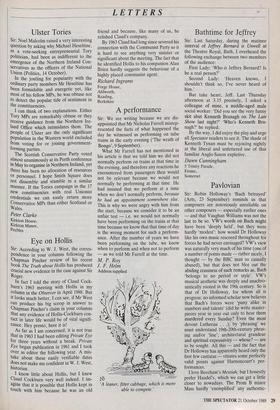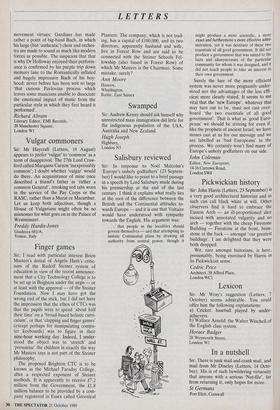Pavlovian
Sir: Robin Holloway's 'Bach betrayed' (Arts, 23 September) reminds us that composers are notoriously unreliable on other composers — especially earlier ones — and that Vaughan Williams was not the last to be so. VW's words on Bach might have been 'deeply held', but they were hardly 'modest': how would Dr Holloway like his own music restored throughout for forces he had never envisaged? VW's view was naturally very much of his time (one of a number of points made — rather nicely, I thought — by the BBC man so casually abused), but that does not blot out the abiding crassness of such remarks as, Bach `belongs to no period or style'. VW's musical aesthetic was deeply and anachro- nistically rooted in the 19th century. So is that of Dr Holloway, for whom all is progress: no informed scholar now believes that Bach's forces were 'puny alike in numbers and talents' (did he write master- pieces year in year out only to hear them murdered every Sunday? Even the most devout Lutheran . .); by 'phrasing' we must understand 19th-20th-century phras- ing and/or `line': architectural grandeur and spiritual expressivity — whose? — are to be sought. All this — and the fact that Dr Holloway has apparently heard only the first few cantatas — vitiates some perfectly valid points against Harnoncourt's per- formances.
I love Beecham's Messiah; but I honestly prefer Handel's, which we can get a little closer to nowadays. The Prom B minor Mass hardly 'exemplified' any authentic-
LETTERS -
movement virtues: Gardiner has made rather a point of big-band Bach, in which his large (but 'authentic') choir and orches- tra are made to sound as much like modern forces as possible. The suspicion that that is why Dr Holloway enjoyed their perform- ance is confirmed by his purple trip down memory lane to the Romantically inflated and hugely impressive Bach of his boy- hood: never before has been writ so large `that curious Pavlovian process which leaves some musicians unable to dissociate the emotional impact of music from the particular style in which they first heard it performed'.
Richard Abram
Literary Editor, EMI Records, 20 Manchester Square, London W1



























































 Previous page
Previous page